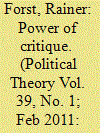| Srl | Item |
| 1 |
ID:
183376


|
|
|
|
|
| Summary/Abstract |
Ali Salem was an independent intellectual, unbound to the regime or political parties. He believed that the intellectual must also be independent from the public. It does not mean he must be detached from society or elevated above it, but that he must avoid flattering it. Over thirty years of literary activity, Salem published 27 plays and hundreds of humoresques and short stories, which were collected in 15 books. He also published opinion pieces in the Egyptian press and periodicals. Salem was an uncompromising social and political whip, who criticized Egypt’s society and regime in the context of a political culture that limits freedom of expression and impedes the expression of views that contradict those of the autocratic ruler. The Article will focus on the witty humor Salem used in both his satires and plays to sharply criticize the socio-political maladies from which Egyptian society suffers and at the same time it served as a means to introduce to Egyptians the problems of their society in a way that would make it easier for them to internalize them, shake them out of their apathy and urge them to act in order to improve their lives for the better.
|
|
|
|
|
|
|
|
|
|
|
|
|
|
|
|
| 2 |
ID:
101846


|
|
|
|
|
| Publication |
2011.
|
| Summary/Abstract |
I regard James Tully's work to be among the most important and innovative
in the contemporary field of what we could call critical political theory. This
not least for the reason that, apart from its many virtues, such as its unique
combination of historical and contemporary social analysis, Tully's approach
explicitly places the theoretical and practical task of social criticism at its
methodological and normative center.
1
I highlight "theoretical and practical"
here to indicate that I will raise some questions about the relation between the
two, and I also highlight "methodological and normative" to do the same
|
|
|
|
|
|
|
|
|
|
|
|
|
|
|
|